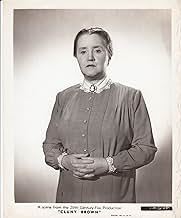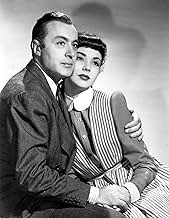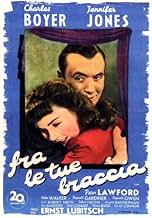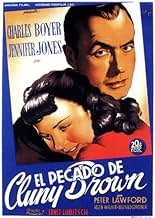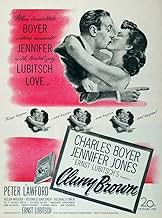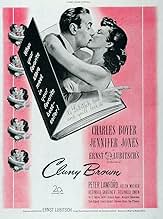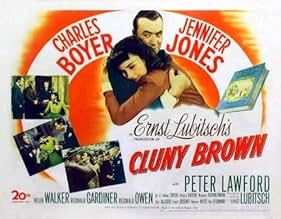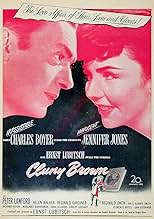IMDb-BEWERTUNG
7,4/10
4396
IHRE BEWERTUNG
Füge eine Handlung in deiner Sprache hinzuA free-spirited parlor maid and a Czech refugee surprise an English village with their unconventional ways.A free-spirited parlor maid and a Czech refugee surprise an English village with their unconventional ways.A free-spirited parlor maid and a Czech refugee surprise an English village with their unconventional ways.
- Auszeichnungen
- 3 wins total
C. Aubrey Smith
- Col. Charles Duff Graham
- (as Sir C. Aubrey Smith)
Norman Ainsley
- Mr. Tupham
- (Nicht genannt)
Billy Bevan
- Uncle Arn Porritt
- (Nicht genannt)
Whit Bissell
- Archie
- (Nicht genannt)
Bette Rae Brown
- Girl at Party
- (Nicht genannt)
Charles Coleman
- Constable Birkins
- (Nicht genannt)
Empfohlene Bewertungen
"Cluny Brown" had quite an impact on me when I saw part of it as a child. I'm sure my feelings had to do with the luminous beauty of Jennifer Jones and wanting to be just like her when I grew up.
Jones has the title role of an imaginative young woman who, being the niece of a plumber, doesn't mind picking up a hammer herself once in a while and having a good whack at the pipes. It gets her into some trouble at the apartment of Hilary Ames (Reginald Sinclair) when she arrives before a party to clear out his sink before his guests arrive.
There she meets Adam Belinski, a Czech academician who's on the run from Hitler. Well, that's who the very earnest Andrew Carmel (Peter Lawford) assumes he is...Belinski never actually says.
When her uncle finds Cluny drunk and on the couch at the Ames apartment, he puts her into service. She winds up working at the Carmel country estate, where Belinski comes to stay.
Attracted to her, he sets about aggravating the local pharmacist, Mr. Wilson (Richard Haydn) who is courting Cluny, and getting involved with Andrew's romance with Betty Cream (Helen Walker).
This is a very sweet, light comedy from Lubitsch that touches on not only the class system in England but the attitude of the upper class toward the impending war. As in the Fox film "This Above All," the upper class in "Cluny Brown" seems annoyed by the mere thought of war and hope the nonsense will just go away. As for Cluny, born to her class, she's expected to work and behave a certain way, though it isn't really her nature.
The performances are all very good, with Boyer a delight as Belinski, a character perhaps modeled on the Czech freedom fighter Jan Mazurek - though he basically doesn't act in danger or worried and manages to hit Andrew up for money. One is never really sure throughout the film what he's up to.
Richard Haydn is hilarious as Cluny's suitor Mr. Wilson, one of the best scenes taking place when he plays the harmonium for her and she all but swoons. As his mother, all Una O'Connor does is cough, but that's all she needs to do.
Playing opposite boyish Peter Lawford, Helen Walker seemed too old for the part of Betty. The other supporting players are all excellent, including Sara Allgood, Reginald Owen, and Margaret Bannerman.
David O. Selznick saw Jennifer Jones in his outer office, and it was love at first sight. It's easy to see why. She is radiant and spirited as Cluny, her vivid imagination shining through her eyes and smile. A wonderful presence - gentle, vulnerable, and guileless.
"Cluny Brown" isn't at the top of Lubitsch's best - it's uneven and doesn't have enough of a plot. It's entertaining nonetheless, and the ending is pure joy.
Jones has the title role of an imaginative young woman who, being the niece of a plumber, doesn't mind picking up a hammer herself once in a while and having a good whack at the pipes. It gets her into some trouble at the apartment of Hilary Ames (Reginald Sinclair) when she arrives before a party to clear out his sink before his guests arrive.
There she meets Adam Belinski, a Czech academician who's on the run from Hitler. Well, that's who the very earnest Andrew Carmel (Peter Lawford) assumes he is...Belinski never actually says.
When her uncle finds Cluny drunk and on the couch at the Ames apartment, he puts her into service. She winds up working at the Carmel country estate, where Belinski comes to stay.
Attracted to her, he sets about aggravating the local pharmacist, Mr. Wilson (Richard Haydn) who is courting Cluny, and getting involved with Andrew's romance with Betty Cream (Helen Walker).
This is a very sweet, light comedy from Lubitsch that touches on not only the class system in England but the attitude of the upper class toward the impending war. As in the Fox film "This Above All," the upper class in "Cluny Brown" seems annoyed by the mere thought of war and hope the nonsense will just go away. As for Cluny, born to her class, she's expected to work and behave a certain way, though it isn't really her nature.
The performances are all very good, with Boyer a delight as Belinski, a character perhaps modeled on the Czech freedom fighter Jan Mazurek - though he basically doesn't act in danger or worried and manages to hit Andrew up for money. One is never really sure throughout the film what he's up to.
Richard Haydn is hilarious as Cluny's suitor Mr. Wilson, one of the best scenes taking place when he plays the harmonium for her and she all but swoons. As his mother, all Una O'Connor does is cough, but that's all she needs to do.
Playing opposite boyish Peter Lawford, Helen Walker seemed too old for the part of Betty. The other supporting players are all excellent, including Sara Allgood, Reginald Owen, and Margaret Bannerman.
David O. Selznick saw Jennifer Jones in his outer office, and it was love at first sight. It's easy to see why. She is radiant and spirited as Cluny, her vivid imagination shining through her eyes and smile. A wonderful presence - gentle, vulnerable, and guileless.
"Cluny Brown" isn't at the top of Lubitsch's best - it's uneven and doesn't have enough of a plot. It's entertaining nonetheless, and the ending is pure joy.
... and the dialogue is just extraordinary.
Cluny Brown (Jennifer Jones) is a young English woman trying to find her place in life. She is quirky, outspoken, and she likes plumbing, mainly from watching her uncle be a plumber for years.
But she has to deal with the snobbery of all of the classes - the middle class represented in a village druggist, the servant class in the head servants in the house she works in, and the rich class. Since films of the time so often made fun of the rich, this one takes a different tack. The rich people are just agog over Czech intellectual and refugee Adam Belinski. They trip over themselves giving him money because it makes them feel like they are being a patron.
Cluny makes people uncomfortable because she does things that make her visible, when it seems that people want her to just disappear into the woodwork, to have no opinion or personality at all, including the village druggist who is considering marrying her. Belinski appreciates her fire and forwardness. He has a similar temperament, but because he is a man and an intellectual, nobody seems to mind the same behavior out of him.
I never cared for Peter Lawford in all of those collegiate MGM musical film roles, but here he is hilarious as the idealist son of a nobleman who is being treated badly by his steady girlfriend, Betty (Helen Walker), who refuses to give him clear signals as to where he stands.
Cluny Brown (Jennifer Jones) is a young English woman trying to find her place in life. She is quirky, outspoken, and she likes plumbing, mainly from watching her uncle be a plumber for years.
But she has to deal with the snobbery of all of the classes - the middle class represented in a village druggist, the servant class in the head servants in the house she works in, and the rich class. Since films of the time so often made fun of the rich, this one takes a different tack. The rich people are just agog over Czech intellectual and refugee Adam Belinski. They trip over themselves giving him money because it makes them feel like they are being a patron.
Cluny makes people uncomfortable because she does things that make her visible, when it seems that people want her to just disappear into the woodwork, to have no opinion or personality at all, including the village druggist who is considering marrying her. Belinski appreciates her fire and forwardness. He has a similar temperament, but because he is a man and an intellectual, nobody seems to mind the same behavior out of him.
I never cared for Peter Lawford in all of those collegiate MGM musical film roles, but here he is hilarious as the idealist son of a nobleman who is being treated badly by his steady girlfriend, Betty (Helen Walker), who refuses to give him clear signals as to where he stands.
I loved this movie. Charles Boyer is always such a smooth actor. Im a sucker for a French accent. It was simple movie with a simple plot. Jennifer Jones was cute in the movie but not the best acting I've seen her do. I really liked her character though. I've watched this movie about 15 times and I cant really explain why, except that it makes me feel good. This is the kind of movie you want to watch if its a rainy, cold day outside and you can curl up with a cup of cocoa. The cocoa will warm your insides and the movie Cluny Brown will warm your heart. I will always treasure this sweet simple romantic comedy. Keep in mind that this is a very old movie and the purpose was for entertainment back then, not detailed plot twists. I think that this movie is worth watching, but don't stop after the first 15 minutes, it does get better. Just watch it!!!Trust me!!
The Lubitsch Touch is evident in this witty, intelligent film. Jennifer Jones shows a vivacity and humor she had never displayed before and would not again until her clever performance in "Beat The Devil". In one amazing scene where she cannot resist showing her wares as a Plumber (to the disdain of the other party guests) she gets to play a reaction to the debacle that is amazing in its combination of pathos and hilarity. Very interesting character actors including a very, very funny Una O'Connor (whose dialogue consists mainly of incessantly clearing her throat), the light as a feather and dead on playing of Margaret Bannerman, and also a chance to see Helen Walker. Charles Boyer plays with his customary light touch and is the anchor to this film, but finally it is Jennifer Jones' performance that takes one breath away and stays with you long after you've seen it.
Cluny Brown (1946)
"It's never too late for a cat." And this is the essence of the movie, a supposed satire on British manners pre-WWII, but more likely just a bit of delightful nonsense. The star for me is the delectable Jennifer Jones who is more than just a pretty decoration-she gives her role as a uninhibitted working class woman a kind of Audrey Hepburn freshness. Before Audrey Hepburn.
Charles Boyer is no doubt the most esteemed star here, but he's his usual self with a bit of forced charm. Director Lubitsch makes the whole scene quite delicious, so it's the big view that makes the small pieces click. (And this is what he is famous for, setting the European scene with a subtle, sharp eye.) There is humor here (it's a comedy, yes) but there is a kind of elegand disdain that is something more than that.
And it's beautifully filmed, by young (great) cinematographer Joe LaShelle.
What holds it all back for me is the writing, which is a kind of forced comedy, creating situations that are "made" for comedy. An awkward confrontation, an improbable entry of one character into another character's world. There is whispering and disbelief and nonchalance all mixed together in a way that is, in fact, lighthearted, but isn't as funny or bright as you would want.
And so the movie zips on, quite fun and lighthearted but always (for me) missing some basic gut humor or even a more trenchant critique of its subject, the British upper class. I did, I have to admit, love the ending, which was perhaps inevitable, but which pulled of a clever telling of the future of the leading characters. Fun, well done! And Jones is sublime even when she's goofy.
"It's never too late for a cat." And this is the essence of the movie, a supposed satire on British manners pre-WWII, but more likely just a bit of delightful nonsense. The star for me is the delectable Jennifer Jones who is more than just a pretty decoration-she gives her role as a uninhibitted working class woman a kind of Audrey Hepburn freshness. Before Audrey Hepburn.
Charles Boyer is no doubt the most esteemed star here, but he's his usual self with a bit of forced charm. Director Lubitsch makes the whole scene quite delicious, so it's the big view that makes the small pieces click. (And this is what he is famous for, setting the European scene with a subtle, sharp eye.) There is humor here (it's a comedy, yes) but there is a kind of elegand disdain that is something more than that.
And it's beautifully filmed, by young (great) cinematographer Joe LaShelle.
What holds it all back for me is the writing, which is a kind of forced comedy, creating situations that are "made" for comedy. An awkward confrontation, an improbable entry of one character into another character's world. There is whispering and disbelief and nonchalance all mixed together in a way that is, in fact, lighthearted, but isn't as funny or bright as you would want.
And so the movie zips on, quite fun and lighthearted but always (for me) missing some basic gut humor or even a more trenchant critique of its subject, the British upper class. I did, I have to admit, love the ending, which was perhaps inevitable, but which pulled of a clever telling of the future of the leading characters. Fun, well done! And Jones is sublime even when she's goofy.
Wusstest du schon
- WissenswertesThis was the last film director Ernst Lubitsch completed himself. He died the following year during the filming of Die Frau im Hermelin (1948).
- PatzerWhen Cluny and Adam and Hilary are in Hilary's living room, just after Cluny says "It's so wonderful to be a cat and read the Daily Mail," the boom mic can be seen in the mirror above Adam's head.
- Zitate
Adam Belinski: In Hyde Park, for instance, some people like to feed nuts to the squirrels. But if it makes you happy to feed squirrels to the nuts, who am I to say, "nuts to the squirrels?"
- VerbindungenEdited into I Love Lucy: The Fox Hunt (1956)
Top-Auswahl
Melde dich zum Bewerten an und greife auf die Watchlist für personalisierte Empfehlungen zu.
- How long is Cluny Brown?Powered by Alexa
Details
- Erscheinungsdatum
- Herkunftsland
- Sprachen
- Auch bekannt als
- Cluny Brown
- Drehorte
- Produktionsfirma
- Weitere beteiligte Unternehmen bei IMDbPro anzeigen
Box Office
- Weltweiter Bruttoertrag
- 17.155 $
- Laufzeit1 Stunde 40 Minuten
- Farbe
- Seitenverhältnis
- 1.37 : 1
Zu dieser Seite beitragen
Bearbeitung vorschlagen oder fehlenden Inhalt hinzufügen


